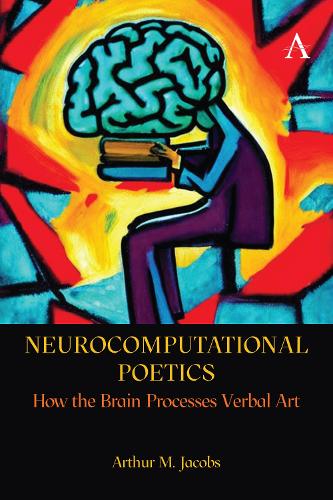
Neurocomputational Poetics: How the Brain Processes Verbal Art
(Paperback)
Publishing Details
Neurocomputational Poetics: How the Brain Processes Verbal Art
By (Author) Arthur Jacobs
Anthem Press
Anthem Press
11th November 2025
United Kingdom
Classifications
Professional and Scholarly
Non Fiction
Digital Humanities / Computer applications in the arts and humanities
Cognition and cognitive psychology
801.92
Physical Properties
Paperback
288
Width 153mm, Height 229mm, Spine 26mm
454g
Description
This book introduces a new thrilling field neurocomputional poetics, the scientific 'marriage' between cognitive poetics, data science and neuroscience.
Its goal is to uncover the secrets of verbal art reception and to explain how readers come to understand and like literary texts. The book offers state-of-the-art computational models and methods allowing to predict which crucial textual features of prose and poetry, such as syntactic and semantic complexity or emotion potential, interact with reader features, such as empathy or openness to experience, in shaping a literary reading act with its neuronal, experiential and behavioural correlates. It contains hands-on practical examples on how to do computational text analyses of books and poems that can answer questions like:
- Which is Jane Austen's most beautiful book
- Which poet created the most fitting poetic metaphors or
- Which author of plays of the nineteenth century was the most literary
The model and methods introduced in the book help explain what makes texts comprehensible and likeable and how they affect our body and mind. It offers game-changing insights for both fundamental and applied science that will affect standard metrics of readability and the way text processing and verbal art reception are viewed in literary studies, education, psychology or the media sciences and industry.
Reviews
This is a seminal and ground-breaking work that will hold a special interest for psychology students, researchers and practitioners in the field of cognitive psychology and verbal communications. -- Midwest
Jacobs book appears as a living creature still in progress, making the content believable for the readers and applicable in their own research experience. [...] It actually shows how literature weaving together the various branches of knowledge offers a way to better understand the human nature in its fascinating complexity and the whole material world determining and surrounding it. This might certainly seem an immeasurable goal, far beyond all hope of achievement, but it is exactly thanks to this new transdisciplinary perspective ... that nowadays literature is so alive.Enthymema
This is a game-changing book which opens up the middle ground of reading, finding ways of connecting the details of the text to the cognitive and neurological structures which we bring as readers, all the way from individual sounds up to whole plot structures. It combines brain science, linguistics, and literary criticism and throughout demonstrates how experimental methods can open up new ways of understanding old problems. -- Nigel Fabb, University of Strathclyde, UK.
"A pioneer in the study of how literary works stir our emotions and transport us to faraway worlds, Jacobs recounts his decades-long personal journey that, through neuroscience and computational linguistics, culminates in a fascinating account of how this magic happens." -- Emanuele Castano, University of Trento and The Institute for Cognitive Sciences and Technologies, CNR, Italy
How does the brain make books light up so that we cant stop reading Arthur Jacobs embarks on a scientific journey to the principles of poetics and reveals nothing less than the natural history of our passions. His extraordinary neurocomputational approach makes this book a worthy successor to Roman Jacobsons Poetics in the 21st Century. Gerhard Lauer, Book and Reading Studies, Gutenberg University of Mainz
Author Bio
Arthur Jacobs is Professor of Experimental and Neurocognitive Psychology at Freie Universitt Berlin (FUB). He is (co-)author of more than 250 scientific publications in the fields of reading research, psycholinguistics, affective neuroscience and neurocognitive poetics, among which is the book Gehirn und Gedicht (Brain and Poetry, 2011; with R. Schrott).
